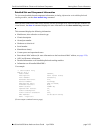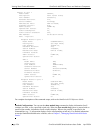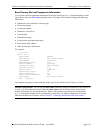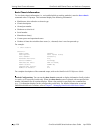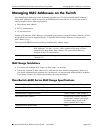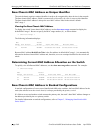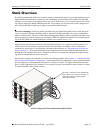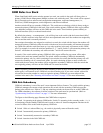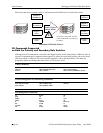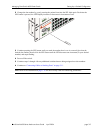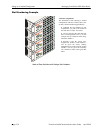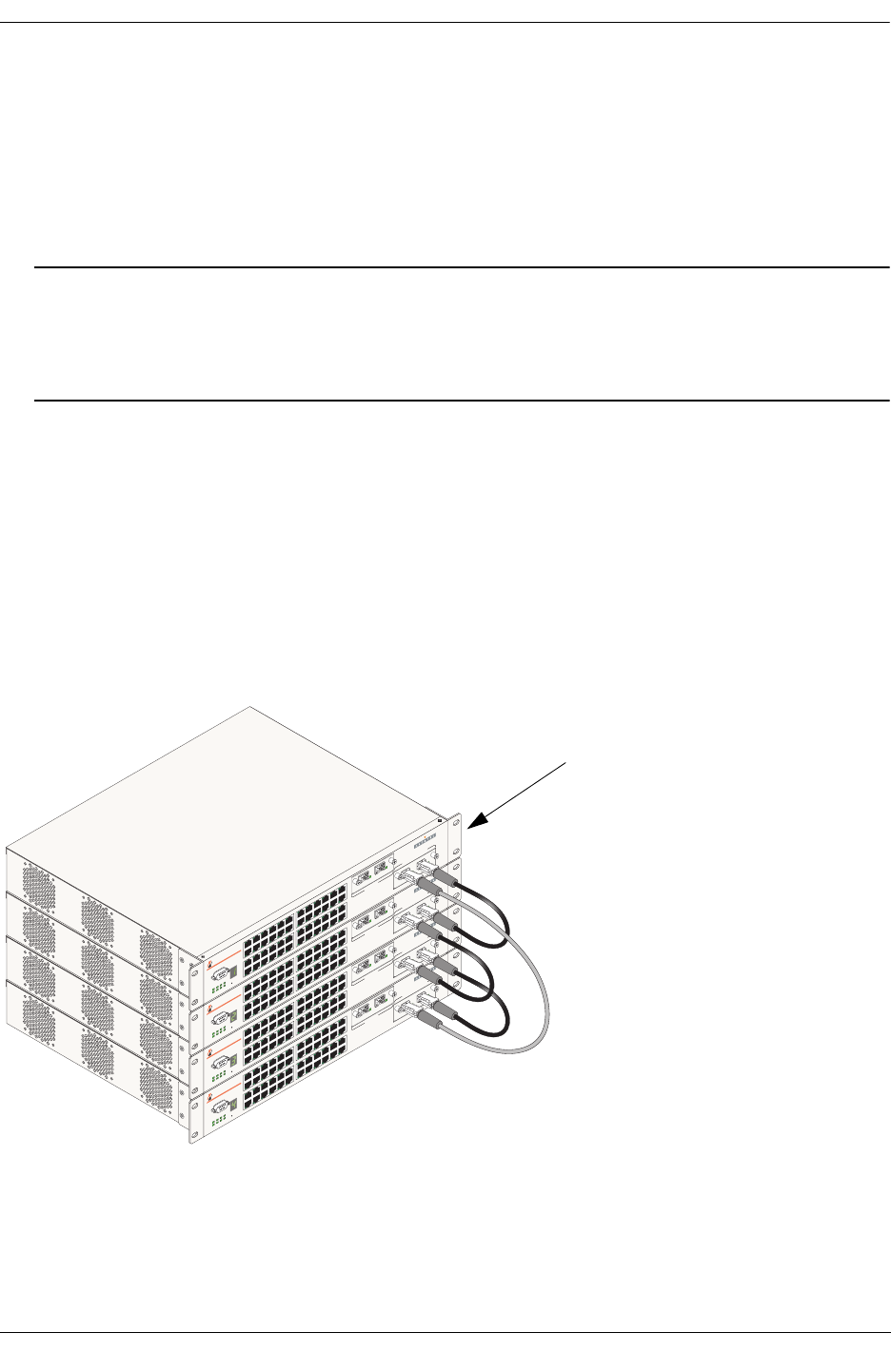
Managing OmniSwitch 6600 Series Stacks Stack Overview
OmniSwitch 6600 Series Hardware Users Guide April 2004 page 3-3
Stack Overview
By default, OmniSwitch 6600 series switches operate in stand-alone mode. You can also configure two to
eight OmniSwitch 6600 series switches (in any combination of OmniSwitch 6624, 6600-U24, and 6648
switches) into one large virtual chassis known as a stack. With stacks, you can easily expand your switch-
ing capacity simply by adding additional switches. For example, you can start with a stack composed of
two switches and add switches (up to eight) as network demands increase.
Note on Terminology. In the user guides provided with your OmniSwitch 6600 series switch, the terms
switch, slot and NI (Network Interface) refer to individual OmniSwitch 6600 series units in stand-alone
mode or within a stack. The term CMM (Chassis Management Module) refers to OmniSwitch 6600 series
units operating in a stack in a primary or secondary CMM role. (OmniSwitch 6600 series switches operat-
ing in an idle CMM role would normally be referred to as a switch, slot, or, NI.)
Stacks also provide enhanced resiliency and redundancy features. If a switch in a stack goes down or is
offline, the stack will continue to operate without user intervention. In addition, when a switch auto-
synchronizes at boot-up or if you manually synchronize the switches (see “Synchronizing Switches in a
Stack” on page 3-17 for more information) switch operating software and configuration parameters are
backed up on all switches in the stack. Therefore if software is corrupted or damaged the original operat-
ing software and parameters can be recovered.
Switches are connected to each other in a stack with stacking modules. (See Chapter 2, “OmniSwitch 6600
Series Chassis and Hardware Components,” in this manual for more information.) These stacking modules
provide high-speed, dual-redundant links between switches in a stack. The figure below shows an exam-
ple of a stack composed of four switches. Every switch in a stack is connected to other switches in a stack
in a dual-redundant “daisy-chain” manner.
A Stack Composed of Four OmniSwitch 6648 Switches
3
4
5
6
7
8
9
1
0
1
1
1
2
1
3
1
4
1
5
1
6
1
7
1
8
1
9
2
0
2
1
2
2
2
3
2
4
1
2
E
X
P
A
N
S
IO
N
/
S
T
A
C
K
IN
G
E
X
P
A
N
S
IO
N
4
9
5
0
5
15
2
T
M
O
m
niSwitch 66
24
O
K
1
O
K
2
P
S
1
P
S
2
P
R
I
S
E
C
T
E
M
P
F
A
N
2
7
2
8
2
9
3
0
3
1
3
2
3
3
3
4
3
5
3
6
3
7
3
8
3
9
4
0
4
1
4
2
4
3
4
4
4
5
4
6
4
7
4
8
2
5
2
6
C
O
N
S
O
L
E
S
E
L
3
4
5
6
7
8
9
1
0
1
1
1
2
1
3
1
4
1
5
1
6
1
7
1
8
1
9
2
0
2
1
2
2
2
3
2
4
1
2
E
X
P
A
N
S
IO
N
/
S
T
A
C
K
IN
G
E
X
P
A
N
S
IO
N
4
9
5
0
5
1
5
2
T
M
O
m
niSw
itch 66
24
O
K
1
O
K
2
P
S
1
P
S
2
P
R
I
S
E
C
T
E
M
P
F
A
N
2
7
2
8
2
9
3
0
3
1
3
2
3
3
3
4
3
5
3
6
3
7
3
8
3
9
4
0
4
1
4
2
4
3
4
4
4
5
4
6
4
7
4
8
2
5
2
6
C
O
N
S
O
L
E
S
E
L
3
4
5
6
7
8
9
1
0
1
1
1
2
1
3
1
4
1
5
1
6
1
7
1
8
1
9
2
0
2
1
2
2
2
3
2
4
1
2
E
X
P
A
N
S
IO
N
/
S
T
A
C
K
IN
G
E
X
P
A
N
S
IO
N
4
9
5
0
5
15
2
T
M
O
mniSw
itch 66
24
O
K
1
O
K
2
P
S
1
P
S
2
P
R
I
S
E
C
T
E
M
P
F
A
N
2
7
2
8
2
9
3
0
3
1
3
2
3
3
3
4
3
5
3
6
3
7
3
8
3
9
4
0
4
1
4
2
4
3
4
4
4
5
4
6
4
7
4
8
2
5
2
6
C
O
N
S
O
L
E
S
E
L
3
4
5
6
7
8
9
1
0
1
1
1
2
1
3
1
4
1
5
1
6
1
7
1
8
1
9
2
0
2
1
2
2
2
3
2
4
1
2
E
X
P
A
N
S
IO
N
/
S
T
A
C
K
IN
G
E
X
P
A
N
S
IO
N
4
9
5
0
5
1
5
2
T
M
O
m
niSwitch 66
24
O
K
1
O
K
2
P
S
1
P
S
2
P
R
I
S
E
C
T
E
M
P
F
A
N
2
7
2
8
2
9
3
0
3
1
3
2
3
3
3
4
3
5
3
6
3
7
3
8
3
9
4
0
4
1
4
2
4
3
4
4
4
5
4
6
4
7
4
8
2
5
2
6
C
O
N
S
O
L
E
S
E
L
L
I
N
K
/
A
C
T
L
I
N
K
/
A
C
T
L
I
N
K
/
A
C
T
L
I
N
K
/
A
C
T
L
I
N
K
/
A
C
T
L
I
N
K
/
A
C
T
L
I
N
K
/
A
C
T
L
I
N
K
/
A
C
T
This stack is composed of four OmniSwitch
6648 switches. All switches in this stack are
connected together in a dual-redundant
“daisy-chain” manner.



